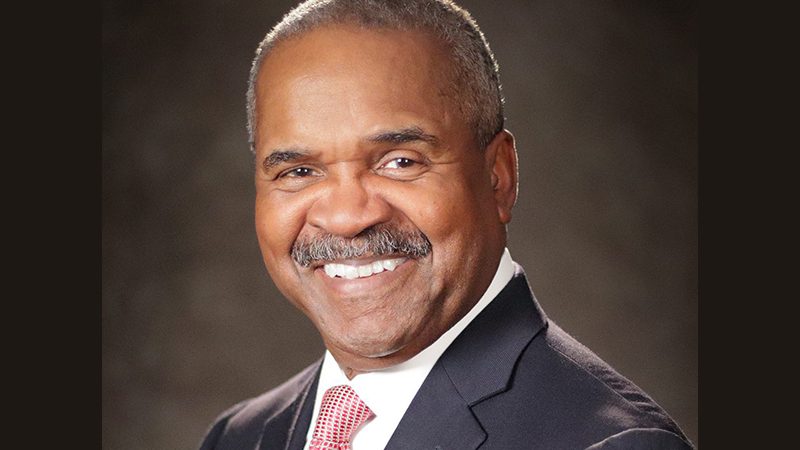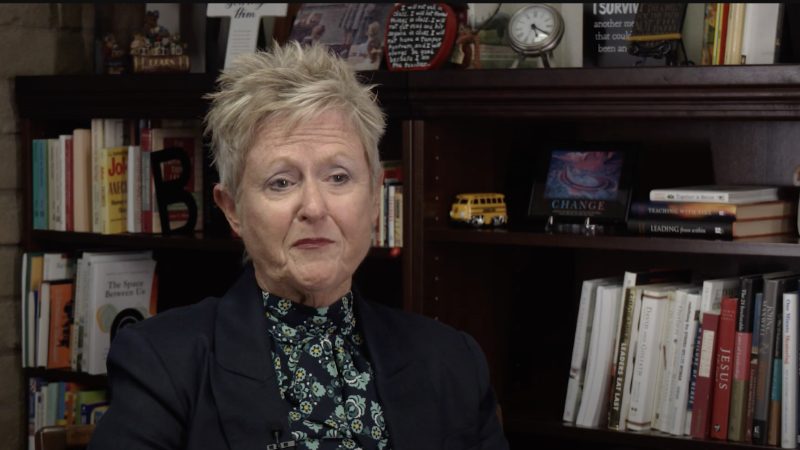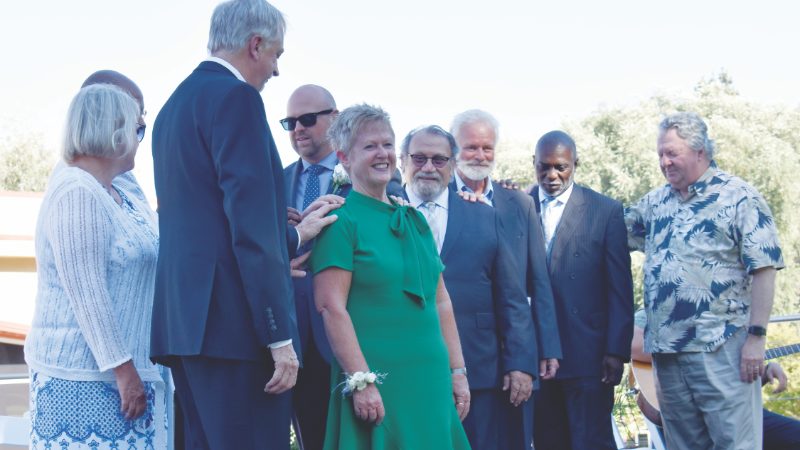
Hey! Leave him alone!” she yelled at the man on the street who was speaking harshly to an elderly man as she was walking by. “What gives you the right to treat him that way?”
“He’s my father. I can talk to him any way I want,” the man angrily snapped back at her, in essence telling her to go away and mind her own business.
“No, you can’t!” she retorted. “If you don’t stop, I’m going to take him home to live with me!”
Though her heart was in the right place, Silvia Malagón did not have the means to follow through on her good intentions, being a young teenager at the time. But this one bold act of advocacy was a small manifestation of the strong burden on her heart to care for the elderly—a burden that actually isn’t a burden but rather her life’s work and greatest joy to this day.
Originally from Los Reyes, Michoacán, Mexico, Malagón, a member of the La Sierra Spanish church in the Southeastern California Conference, was born into a traditional Catholic family.
Though her family was not particularly active in religious life, her mother taught her children that there was a God in heaven. One day, after the family had moved to Mexico City, a group of Jehovah’s Witnesses came knocking, bringing with them Bibles and new information that sparked in Malagón new questions about God. “Dear God,” she prayed, while looking up into the dark starry night. “My mom says you’re in heaven, but these people say I can find you in a book. Where are you?” The answer didn’t come immediately, and life moved on, but an answer was in the works.
All during her childhood and teenage years, Malagón kept seeking ways to help the elderly. On one occasion, she begged her father to allow a lost elderly indigenous woman who was wandering around their property to spend the night in their home. Though Malagón couldn’t speak the woman’s dialect and the woman didn’t speak Spanish, they communicated enough for the family to bring her home and give her a meal and a bed for the night. Malagón also often ministered to elderly unhoused people on the streets by rubbing lotion on their severely cracked bare feet. She also found ways to provide food and clothing for elderly in need.
At age 19, Malagón met her future husband. Though she couldn’t pinpoint what it was, she felt like there was something special about him—that he was different from other young men she’d met. What she didn’t know was that he had just returned from studying at a university called Montemorelos. Part of their friendship included him telling her Bible stories and other things she had never heard. But he never mentioned what church he belonged to.
“You’re not Catholic,” she ventured one day. “What are you?”
“Seventh-day Adventist,” he replied.
“What’s that? What does that mean?”
“It’s about doing God’s will,” he said. Eventually, he invited her to church, and Malagón never looked back. The experience was not so much new as it was refreshing and soul nurturing—the music, the prayers, the teachings, the fellowship. She felt as if she had experienced a piece of heaven, a true spiritual feast. She had found her place and her people. Malagón paid a price for her newfound faith, including the loss of friends and employment, but all that mattered to her was that she had finally met God and that she wanted to get to know Him more.
Shortly after getting married, Malagón underwent a severe health crisis that required a long and painful surgery, as well as a miscarriage and a high-risk pregnancy. It was through these trials that Malagón feels she experienced God the most in her life—when she pressed in closer to Him and asked for revelation. “It is through trials that we truly experience God and that He reveals His faithfulness and presence,” she said as she reflected on that time in her life.
The couple eventually settled in the United States, now the parents of two young boys, and it was here that her girlhood prayers of finding ways to serve the elderly were fully answered.

Malagón began by caring for the aging parent of a church member by going to her home to help with meals and daily care, something she poured her heart into. Over time, other families began to seek her out to help with their elderly family members or friends. It wasn’t just that Malagón provided physical care for her clients—she offered them genuine love, companionship, and affirmation that made a meaningful difference in both their physical and emotional well-being. Where they once felt lonely or depressed, they now felt alive and cheerful.
Eventually, Malagón opened her own house to care for the elderly, a dream she had long hoped to be able to accomplish. She earnestly sought God’s help and guidance through prayer in doing so, such as learning as much as she could about nutrition in order to prepare healthful, nourishing meals. She conducts Friday night vespers and sundown worship on Sabbath, including hymn singing and testimonies. She patiently navigates conditions such as memory loss or unpredictable emotions that come with cognitive decline, and she helps families better understand and relate to their aging loved one. She believes that with proper care, healthful nutrition, and, most of all, a lot of love and patience, the elderly can still thrive within the context of any other age or health-related limitations they may have. Her new dream is to write a book to help families and churches better understand, care for, and serve their aging loved ones and members.
“To see them getting better, having quality of life, and a having desire to live is the greatest reward,” Malagón said of her life’s work. “I just love my viejitos [elderly folks] so much. I love spending time with them, talking with them, and seeing them thrive. I believe that even in their old age, God can still use them.”
_____________________________
Cynthia Mendoza is a freelance writer from Southern California.
Ministrar a los jóvenes de corazón
Por Cynthia Mendoza

Eh! ¡Déjalo en paz!», le gritó al hombre de la calle que hablaba con dureza a un anciano que pasaba por ahí. «¿Qué te da derecho a tratarlo de esa manera?»
«Es mi padre. Puedo hablar con él de la manera que quiera», le espetó el hombre enojado, diciéndole en esencia que se fuera y se ocupara de sus propios asuntos.
«¡No, no puedes!», replicó ella. «¡Si no te detienes, lo llevaré a casa para que viva conmigo!»
A pesar de que su corazón estaba en el lugar correcto, Silvia Malagón no tenía los medios para llevar a cabo sus buenas intenciones, siendo una joven adolescente en ese momento. Pero ese audaz acto de defensa fue una pequeña manifestación de la fuerte carga que pesaba sobre su corazón para cuidar a los ancianos, una carga que en realidad no es una carga, sino el trabajo de su vida y su mayor alegría hasta el día de hoy.
Originaria de Los Reyes, Michoacán, México, Malagón, miembro de la iglesia hispana de La Sierra en la Southeastern California Conference, nació en una tradicional familia católica.
Aunque su familia no era particularmente activa en la vida religiosa, su madre enseñó a sus hijos que había un Dios en el cielo. Un día, después de que la familia se había mudado a la Ciudad de México, un grupo de testigos de Jehová llamó a su puerta, trayendo consigo Biblias y nueva información que despertó en Malagón nuevas preguntas sobre Dios. «Dios mío», oró, mientras miraba hacia la oscura estrellada noche. «Mi mamá dice que estás en el cielo, pero esta gente dice que puedo encontrarte en un libro. ¿Dónde estás?» La respuesta no llegó de inmediato y la vida siguió adelante, pero la respuesta estaba por llegar.
Durante toda su infancia y adolescencia, Silvia siguió buscando formas de ayudar a los ancianos. En una ocasión, le rogó a su padre que permitiera que una anciana indígena perdida que deambulaba por su propiedad pasara la noche en su casa. Aunque Silvia no podía hablar el dialecto de la mujer y la mujer no hablaba español, se comunicaron lo suficiente como para que la familia la trajera a casa y le diera comida y una cama para pasar la noche. Silvia también solía ministrar a los ancianos indigentes en las calles frotando loción en sus pies descalzos severamente agrietados. También encontró formas de proporcionar alimentos y ropa a los ancianos necesitados.
A los 19 años, Silvia conoció a su futuro marido. Aunque no podía precisar qué era, sentía que había algo especial en él, que era diferente de otros jóvenes que había conocido. Lo que no sabía era que él acababa de regresar de estudiar en una universidad llamada Montemorelos. Parte de su amistad incluía que él le contara historias bíblicas y otras cosas que ella nunca había escuchado. Pero nunca mencionó a qué iglesia pertenecía.
«Tú no eres católico», le dijo un día. »¿Qué eres?»
«Adventista del Séptimo Día», le respondió.
«¿Qué es eso? ¿Qué significa eso?»
«Se trata de hacer la voluntad de Dios», dijo. Eventualmente, él la invitó a la iglesia, y Silvia nunca miró hacia atrás. La experiencia no fue tanto nueva como refrescante y nutritiva para su alma: la música, las oraciones, las enseñanzas, el compañerismo. Se sentía como si hubiera experimentado un pedazo de cielo, una verdadera fiesta espiritual. Había encontrado su lugar y a su gente. Silvia pagó un precio por su nueva fe, incluida la pérdida de amigos y empleos, pero lo único que le importaba era que finalmente había encontrado a Dios y que quería conocerlo más.
Poco después de casarse, Silvia sufrió una grave crisis de salud que requirió una larga y dolorosa cirugía, así como un aborto espontáneo y un embarazo de alto riesgo. Fue a través de esas pruebas que Silvia siente que experimentó a Dios más en su vida, cuando se acercó más a él y le pidió su revelación. «Es a través de las pruebas que verdaderamente experimentamos a Dios y que él revela su fidelidad y presencia», dijo mientras reflexionaba sobre ese momento de su vida.
La pareja finalmente se estableció en los Estados Unidos, ahora siendo padres de dos niños pequeños, y fue aquí donde sus oraciones de niña para encontrar formas de servir a los ancianos fueron completamente contestadas.

Silvia comenzó cuidando a la anciana madre de un miembro de iglesia yendo a su casa para ayudar con las comidas y el cuidado diario, algo en lo que puso su corazón. Con el tiempo, otras familias comenzaron a buscarla para ayudar con sus familiares o amigos mayores. No era solo que Silvia brindaba atención física a sus clientes, sino que les ofrecía amor genuino, compañía y afirmación que hicieron una diferencia significativa en su bienestar físico y emocional. Donde antes se sentían solos o deprimidos, ahora se sentían con vida y alegres.
Con el tiempo, Silvia abrió su propia casa para cuidar a los ancianos, un sueño que había anhelado durante mucho tiempo poder cumplir. Para hacerlo, buscó fervientemente la ayuda y la dirección de Dios a través de la oración, como aprender todo lo que pudo sobre nutrición para preparar comidas saludables y nutritivas. Ella dirige las vísperas del viernes por la noche y la adoración del atardecer el sábado, incluyendo el canto de himnos y testimonios. Ella navega pacientemente por condiciones como la pérdida de la memoria o las emociones impredecibles que vienen con el deterioro cognitivo, y ayuda a las familias a comprender y relacionarse mejor con sus seres queridos mayores. Silvia cree que con el cuidado adecuado, una nutrición saludable y, sobre todo, mucho amor y paciencia, los ancianos aún pueden prosperar en el contexto de cualquier otra limitación relacionada con la edad o la salud que puedan tener. Su nuevo sueño es escribir un libro para ayudar a las familias y a las iglesias a comprender, cuidar y servir mejor a sus seres queridos y miembros mayores.
«Verlos mejorar, tener calidad de vida y tener ganas de vivir es la mayor recompensa», dijo Silvia sobre el trabajo de su vida. «Amo mucho a mis viejitos. Me encanta pasar tiempo con ellos, hablar con ellos y verlos prosperar. Creo que incluso en su vejez, Dios todavía puede usarlos».
_____________________________
Cynthia Mendoza es una escritora independiente del sur de California.





